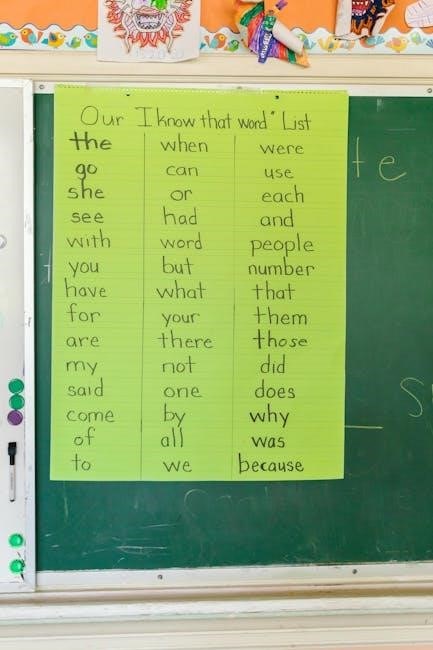The 11 Plus Vocabulary List is a comprehensive resource designed to help students prepare for the exam․ It includes high-frequency words with meanings‚ synonyms‚ and antonyms‚ aiding in understanding complex texts and improving communication skills․ This list is widely used by parents and educators to ensure students are well-prepared for the challenges of the exam‚ focusing on expanding vocabulary effectively․
What is the 11 Plus Exam?
The 11 Plus Exam is a selective assessment taken by students in the UK‚ typically at the end of primary school‚ to determine eligibility for grammar school admission․ It evaluates skills in areas like vocabulary‚ comprehension‚ and reasoning․ A strong vocabulary is crucial for success‚ as it aids in understanding complex texts and answering questions accurately․ The exam is highly competitive‚ and preparation often involves resources like the 11 Plus Vocabulary List with meanings PDF‚ which provides high-frequency words‚ synonyms‚ and antonyms․ This tool helps students expand their lexical knowledge‚ enabling them to tackle the exam with confidence and improve their overall communication skills․
Why is Vocabulary Important for the 11 Plus?
Vocabulary is a cornerstone of success in the 11 Plus exam‚ as it directly impacts a student’s ability to comprehend and interpret complex texts․ A strong command of words enhances reading skills‚ allowing students to grasp nuances in passages and answer questions confidently․ Additionally‚ vocabulary knowledge is essential for verbal reasoning sections‚ where understanding word meanings and relationships is critical․ The 11 Plus Vocabulary List with meanings PDF is a valuable resource‚ offering high-frequency words‚ synonyms‚ and antonyms․ By mastering this vocabulary‚ students can improve their overall performance‚ ensuring they are well-prepared for the exam’s challenges and beyond․ Effective vocabulary learning also fosters better communication skills‚ benefiting students in all areas of their education․
Structure of the 11 Plus Vocabulary List
The 11 Plus Vocabulary List is structured to provide clarity and accessibility‚ making it an effective study tool․ It typically includes a wide range of words‚ each accompanied by their meanings‚ synonyms‚ and antonyms․ The list is often organized alphabetically‚ allowing students to easily locate and review specific words․ Additionally‚ high-frequency words are highlighted to ensure focus on the most commonly tested vocabulary․ The inclusion of contextual examples helps students understand how words are used in sentences‚ enhancing their comprehension and retention․ This organized approach ensures that students can systematically build their vocabulary‚ preparing them for the challenges of the exam and beyond․

Key Features of the 11 Plus Vocabulary List with Meanings PDF
The PDF features a wide range of vocabulary words‚ their meanings‚ synonyms‚ and antonyms‚ organized alphabetically for easy reference․ It is free‚ downloadable‚ and designed to aid exam preparation effectively․
Overview of the PDF Format
The PDF format of the 11 Plus Vocabulary List with Meanings is designed for easy accessibility and readability․ It is a free downloadable resource that contains over ‚ each accompanied by their meanings‚ synonyms‚ and antonyms․ The list is alphabetically organized‚ making it simple for students to navigate and study․ Each word is presented clearly‚ with its meaning and related terms provided to enhance understanding․ The PDF is compatible with all devices‚ allowing students to study anytime and anywhere․ Additionally‚ the clean layout ensures that the content is not overwhelming‚ making it an ideal study tool for children aged 10-11 preparing for grammar school exams․ This format is widely praised for its clarity and effectiveness in aiding vocabulary development․
Benefits of Using the PDF List
The 11 Plus Vocabulary List with Meanings PDF offers numerous benefits for students preparing for the exam․ It provides a comprehensive collection of over ‚ each accompanied by clear meanings‚ synonyms‚ and antonyms․ This resource is free and easily downloadable‚ making it accessible to all․ The PDF format ensures that the content is neatly organized and readable on any device‚ allowing students to study at their convenience․ By using this list‚ students can enhance their understanding of complex words and improve their communication skills․ The structured layout and alphabetical organization make it easy to navigate‚ ensuring effective learning and preparation for the 11 Plus exam․
How to Access and Download the PDF
Accessing and downloading the 11 Plus Vocabulary List with Meanings PDF is straightforward and convenient․ The PDF is available for free on various educational websites‚ such as ElevenPlusExams․co․uk‚ and can be downloaded directly with just a few clicks․ No registration or payment is required‚ making it easily accessible for all users․ The PDF is formatted to be user-friendly‚ ensuring that the vocabulary list‚ along with meanings‚ synonyms‚ and antonyms‚ is clear and easy to read․ Once downloaded‚ it can be viewed on any device‚ allowing students to study flexibly․ This resource is a valuable tool for preparing for the 11 Plus exam‚ providing essential vocabulary in an organized and accessible format․

Understanding the Vocabulary Words

The 11 Plus Vocabulary List with Meanings PDF contains essential words‚ each clearly defined with examples‚ helping students grasp complex texts and enhance their language skills effectively․
High-Frequency Vocabulary Words
The 11 Plus Vocabulary List includes high-frequency words that appear regularly in exam questions․ These words are essential for comprehension and expression‚ aiding students in tackling various question types․ Each word is paired with its meaning‚ synonyms‚ and antonyms‚ ensuring a deep understanding․ Regular practice with these words enhances reading and writing skills‚ crucial for success in the 11 Plus exam․ The list is structured alphabetically‚ making it easy for students to review and memorize․ Mastering these high-frequency words builds a strong foundation for future academic challenges‚ providing confidence and fluency in language use․ Consistent practice is key to retaining these words effectively․
Synonyms and Antonyms in the List
The 11 Plus Vocabulary List provides synonyms and antonyms for each word‚ enhancing understanding of word relationships․ Synonyms offer alternative expressions‚ while antonyms contrast meanings‚ enriching vocabulary usage․ This feature helps students grasp nuances in word meanings‚ essential for precise communication․ By learning these pairs‚ students can expand their lexical knowledge‚ improving both written and verbal skills; The inclusion of synonyms and antonyms also aids in identifying word associations‚ a critical skill for exam success․ Regular practice with these pairs reinforces memory and application‚ ensuring students can use vocabulary effectively in various contexts․ This comprehensive approach strengthens their ability to interpret and express ideas clearly and accurately․
Understanding Word Meanings and Contexts
Understanding word meanings and contexts is crucial for excelling in the 11 Plus exam․ The vocabulary list with meanings pdf provides detailed explanations of each word‚ including how they function in sentences․ Contextual learning helps students grasp both literal and figurative meanings‚ enabling them to interpret words accurately in different scenarios․ The list also includes example sentences‚ demonstrating how words are used in real-life situations․ This approach ensures students can apply their knowledge effectively in comprehension and writing tasks․ By focusing on word meanings and contexts‚ learners develop a deeper understanding of language‚ enhancing their ability to analyze texts and express ideas clearly․ This skill is essential for success in the exam and beyond․

How to Use the Vocabulary List Effectively
- Incorporate the list into daily study routines for consistent learning․
- Use flashcards or interactive tools to memorize words effectively․
- Review and apply words in sentences to enhance retention and understanding․
Study Tips for Mastering the Vocabulary
Mastering the 11 Plus vocabulary list requires consistent effort and effective strategies․ Start by dedicating 15–20 minutes daily to review words‚ using flashcards or digital tools for convenience․ Focus on understanding meanings in context rather than memorizing definitions alone․ Practice creating sentences with each word to reinforce retention․ Use mnemonics or associations to help remember tricky words․ Regularly test yourself or have someone quiz you to identify gaps in knowledge․ Incorporate games and activities to make learning engaging․ Teach others what you’ve learned to deepen your own understanding․ Finally‚ track progress and revisit challenging words frequently to build confidence and fluency over time․
Practice Exercises and Worksheets

Practice exercises and worksheets are essential tools for reinforcing vocabulary skills․ Utilize downloadable PDFs that include word searches‚ crosswords‚ and fill-in-the-blank exercises․ These activities help students engage with words in different contexts‚ improving comprehension and retention․ Worksheets often feature synonyms‚ antonyms‚ and word meanings‚ allowing students to apply their knowledge practically․ Regular use of these resources ensures familiarity with exam-style questions and builds confidence․ Parents and educators can track progress through completed exercises‚ identifying areas for further review․ By incorporating these resources into daily study routines‚ students can systematically master the vocabulary list and perform effectively in the 11 Plus exam․
Integrating Vocabulary into Daily Learning
Integrating vocabulary into daily learning enhances retention and application․ Encourage students to use new words in sentences‚ fostering a deeper understanding of meanings․ Parents and educators can incorporate vocabulary into casual conversations‚ making learning natural and enjoyable․ Reading books with challenging words and discussing their contexts can also reinforce knowledge․ Additionally‚ creating flashcards or word walls at home provides constant visual reminders․ By weaving vocabulary practice into everyday activities‚ students develop a robust command of words‚ which is crucial for success in the 11 Plus exam and beyond․ Consistent exposure ensures that vocabulary becomes a habitual part of their language skills‚ leading to improved academic performance and communication abilities․ Regular review and practical application are key to long-term retention and effective use of the vocabulary list․

Additional Resources for Vocabulary Development
Enhance vocabulary learning with free worksheets‚ online tools‚ and recommended books․ These resources complement the 11 Plus Vocabulary List‚ offering diverse practice methods and in-depth guides․
Free 11 Plus Vocabulary Worksheets
Free 11 Plus vocabulary worksheets are an excellent way to enhance your child’s vocabulary skills․ These worksheets‚ available in PDF format‚ provide a variety of exercises such as word matching‚ fill-in-the-blanks‚ and crossword puzzles․ They are designed to make learning engaging and fun while helping your child build a strong foundation for the 11 Plus exam․ Many of these worksheets focus on high-frequency vocabulary words‚ ensuring your child is well-prepared for the exam․ Additionally‚ they often include word meanings‚ synonyms‚ and antonyms‚ which are crucial for understanding complex texts․ These resources are free to download and offer a structured approach to vocabulary development‚ making them a valuable tool for parents and educators alike․
Online Tools for Vocabulary Practice
Online tools for vocabulary practice offer interactive and engaging ways to master the 11 Plus vocabulary list․ Websites provide games‚ quizzes‚ and exercises tailored to reinforce word meanings‚ synonyms‚ and antonyms․ These tools are accessible anywhere‚ making learning flexible and fun․ They often track progress‚ highlighting areas needing improvement․ Parents and educators can use these resources to supplement study materials‚ ensuring children engage with vocabulary in a dynamic way․ By leveraging technology‚ online tools make vocabulary practice enjoyable and effective‚ preparing students confidently for the exam while fostering lifelong learning skills․
Recommended Books and Guides
Several books and guides are available to support 11 Plus vocabulary preparation․ Titles like “Year 4 Series ⏤ 11 English Vocab” offer structured word lists with meanings‚ while comprehensive guides provide tips for effective learning․ Many resources include practice exercises and quizzes to reinforce understanding․ Popular books like “11 Plus Vocabulary Master” focus on high-frequency words and their usage in context․ Additionally‚ specialized guides cater to different learning styles‚ offering visual‚ auditory‚ and kinesthetic approaches․ These resources are invaluable for parents and educators‚ ensuring a well-rounded approach to vocabulary development․ They complement the 11 Plus vocabulary list with meanings PDF‚ offering diverse ways to engage with and master the content․

Advanced Strategies for Vocabulary Learning
Advanced strategies include using mnemonics‚ learning words in context‚ and catering to different learning styles․ These techniques enhance retention and understanding‚ aiding 11 Plus preparation effectively․
Using Mnemonics for Better Retention
Mnemonics are powerful tools for retaining vocabulary․ Techniques like acronyms‚ rhymes‚ or mind maps help associate words with memorable cues․ For example‚ creating a sentence using the first letters of a word’s meaning can enhance recall․ Mnemonics also make learning engaging and fun‚ reducing study stress․ By linking new words to something familiar‚ students can retain meanings longer․ This method is especially effective for visual or auditory learners․ Regular practice with mnemonic aids can significantly improve vocabulary retention‚ making it easier to excel in the 11 Plus exam․ Encourage creative mnemonic strategies to make learning enjoyable and effective․
Learning Vocabulary in Context
Learning vocabulary in context is a highly effective method for understanding and retaining word meanings․ By encountering words within sentences or passages‚ students can grasp their usage and connotations more effectively․ This approach helps students associate words with specific scenarios‚ making them easier to remember․ For instance‚ reading comprehension exercises or example sentences in the 11 Plus Vocabulary List can provide clear contexts for learning․ This method also enhances the ability to understand complex texts‚ a crucial skill for the exam․ Regular exposure to words in context improves both comprehension and application‚ ensuring students can use vocabulary confidently in various situations․ This strategy is particularly beneficial for visual and auditory learners‚ as it engages multiple learning styles simultaneously․
Teaching Vocabulary to Different Learning Styles
Adapting vocabulary instruction to different learning styles ensures effective learning for all students․ Visual learners benefit from flashcards‚ diagrams‚ and highlighted meanings in the 11 Plus Vocabulary List․ Auditory learners can use audio resources‚ pronunciation guides‚ and group discussions to engage with words․ Kinesthetic learners thrive with hands-on activities‚ such as writing exercises‚ word games‚ and interactive quizzes․ By tailoring methods to individual preferences‚ educators can maximize retention and understanding․ This approach fosters a dynamic learning environment‚ ensuring that every student can master the vocabulary list in a way that suits their unique learning needs․ Diverse teaching strategies make vocabulary acquisition enjoyable and impactful for all learners․

Common Challenges and Solutions
Overcoming Vocabulary Learning Obstacles
Common challenges include retaining complex words and understanding their contexts․ Solutions involve creating study schedules‚ using flashcards‚ and incorporating games to make learning engaging and effective․
One of the most common challenges in learning vocabulary for the 11 Plus exam is retaining complex words and their meanings․ Students often struggle with understanding contexts and applying words appropriately․ To overcome this‚ mnemonics and flashcards can be effective tools․ Breaking down words into prefixes‚ suffixes‚ and roots helps in deciphering meanings․ Regular practice through interactive games and exercises keeps the process engaging․ Encouraging students to use new words in sentences reinforces their understanding․ Additionally‚ leveraging the 11 Plus Vocabulary List with meanings PDF provides a structured approach‚ ensuring consistent practice and gradual mastery of the words․ Tailoring study methods to individual learning styles also helps in addressing specific difficulties effectively․
Addressing Gaps in Vocabulary Knowledge
Identifying and filling gaps in vocabulary knowledge is crucial for 11 Plus success․ The 11 Plus Vocabulary List with meanings PDF offers a structured approach to bridge these gaps by providing a comprehensive collection of high-frequency words․ Each word is accompanied by its meaning‚ synonyms‚ and antonyms‚ enabling students to understand word relationships and contexts deeply․ Regular review and practice with the list help students systematically address weak areas․ The PDF’s organized format allows learners to track progress‚ ensuring no critical words are overlooked․ By focusing on understanding and application‚ students can effectively fill vocabulary gaps and build a strong foundation for the exam․

Motivating Children to Engage with Vocabulary
Motivating children to engage with vocabulary is essential for their 11 Plus preparation․ Using the 11 Plus Vocabulary List with meanings PDF‚ parents and educators can create interactive learning experiences․ Games‚ quizzes‚ and rewards encourage active participation․ Incorporating technology‚ such as apps or online tools‚ makes learning fun․ Positive reinforcement and celebrating progress‚ no matter how small‚ boosts confidence․ Integrating vocabulary into daily routines‚ like reading or conversations‚ helps children see its relevance․ The structured format of the PDF allows for tracking progress‚ making learning feel achievable․ By fostering a love for words early on‚ children develop a strong foundation for the exam and lifelong vocabulary development․
The 11 Plus Vocabulary List with meanings PDF is a vital tool for effective exam preparation‚ helping students build a strong vocabulary foundation for success․
Final Tips for Success
Consistent practice and regular revision of the 11 Plus Vocabulary List with meanings PDF are crucial for long-term retention․ Encourage active learning techniques like flashcards‚ games‚ and contextual exercises to make studying engaging․ Setting achievable daily goals helps maintain momentum without overwhelming the student․ Additionally‚ integrating vocabulary into everyday activities‚ such as reading or conversation‚ reinforces learning․ Parents and educators should provide positive reinforcement and celebrate progress‚ fostering a love for language that extends beyond the exam․ By combining these strategies with the structured resources provided‚ students can confidently master the vocabulary and achieve success in their 11 Plus journey․
The Importance of Consistent Practice
Consistent practice is vital for mastering the 11 Plus Vocabulary List with meanings PDF․ Regular review ensures that new words are retained in long-term memory‚ reducing the risk of forgetting․ Even short daily sessions can significantly improve understanding and confidence․ Parents and educators should encourage a structured routine‚ incorporating activities like quizzes‚ puzzles‚ and reading exercises․ This steady approach helps students build a robust vocabulary foundation‚ essential for tackling complex texts and questions in the exam․ By prioritizing consistency‚ students can gradually expand their word knowledge and develop the skills needed to excel in the 11 Plus and beyond․
Encouraging Lifelong Vocabulary Development
Fostering a love for learning is key to lifelong vocabulary development․ The 11 Plus Vocabulary List with meanings PDF serves as a foundation‚ but extending learning beyond the exam is crucial․ Encourage reading diverse genres‚ discussing unfamiliar words‚ and using language in creative ways․ Parents and educators can model lifelong learning by exploring new words alongside students․ Integrating vocabulary into daily routines‚ such as through conversations or games‚ makes learning enjoyable and sustainable․ This approach not only prepares students for exams but also equips them with skills to navigate future academic and professional challenges with confidence and curiosity․
